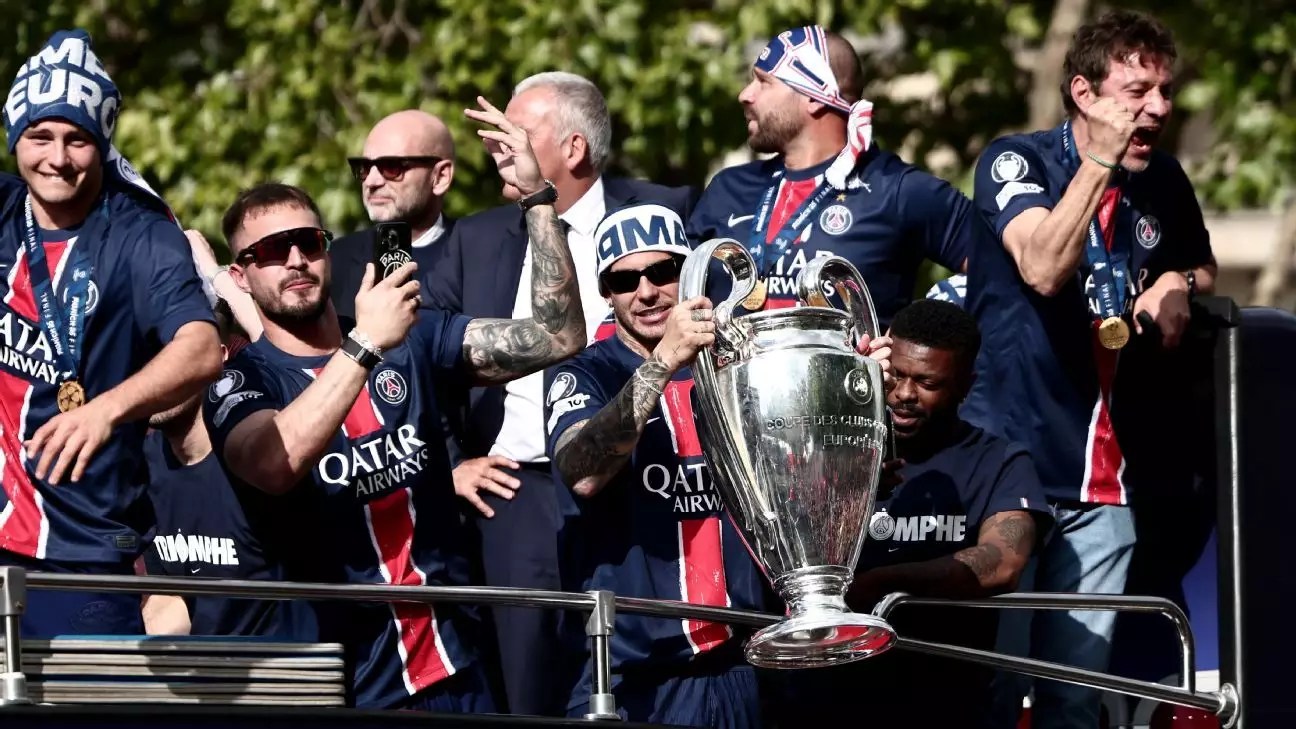In a heart-pounding culmination of years of aspirations, Paris Saint-Germain (PSG) achieved the unthinkable by clinching their inaugural Champions League title. Following their resounding 5-0 victory over Inter Milan in Munich, the jubilance echoed through the streets of Paris, culminating in an open-top bus parade along the world-renowned Champs-Elysees. However, this momentous occasion was starkly overshadowed by a grim backdrop of violence and tragedy that marred the festivities. Amidst this visceral joy, the fact that two lives were lost and over 200 others injured cast a dark cloud over the celebratory atmosphere.
As thousands of blue and red-clad fans congregated, their spirits were rekindled by the sight of captain Marquinhos hoisting the coveted trophy, yet that thrill collided with the reality of the night before. While the Eiffel Tower illuminated in club colors painted a vibrant image of triumph, the undercurrents of violence told a disheartening tale.
From Euphoria to Catastrophe
The overnight celebrations should have been a collective outpouring of joy, but events spiraled out of control. Reports revealed a tragic incident involving a 17-year-old boy fatally stabbed during a PSG gathering in Dax. Authorities clarified that this heinous act had no direct association with the match itself, raising questions about the prevailing culture surrounding football celebrations in France. Additionally, a young man in his twenties fell victim in a fatal accident linked to a scooter during the chaotic celebrations in Paris, further amplifying the lamentable narrative.
In a disheartening twist, while fans enjoyed the triumphant moments, a police officer found himself in an artificial coma due to severe injuries inflicted by fireworks at another gathering, highlighting the potential dangers that accompany such exhilarating events. With the overarching quest for jubilation now coupled with a surge of violence, the duality of the night could not be more pronounced.
The Irony of Glory
In a statement widely circulated post-victory, PSG emphasized that the triumph should serve as a catalyst for unity and collective celebration. The club condemned the violence, recognizing that the overwhelming majority of fans seek only to bask in the glory of their beloved team’s success. However, the narrative twisted yet again as incitements of riots, looting, and scuffles marred an otherwise jubilant environment. Street violence and property destruction occurred in several areas, with vast numbers of police mobilized to contain the mayhem.
Accusations arose, claiming that some individuals came not to celebrate the beautiful game but to embrace chaos. Interior Minister Bruno Retailleau correctly voiced frustration over the violence. His remarks highlight a pervasive issue; even amidst celebrations, a sect of individuals seems more inclined towards mayhem than camaraderie.
Moreover, the celebratory atmosphere was tainted with incidents of looting and vandalism, where stores along the Champs-Elysees faced break-ins, and a fire aggravated by celebratory enthusiasm threatened public safety. This irony of jubilant celebration intertwined with loss raises pertinent questions about the safety and intent behind football festivities, revealing a frayed societal fabric that seems to whisper deeply rooted problems within factions of the fandom.
Regaining Control over Celebrations
Despite the turmoil, the resilience of Paris Saint-Germain’s fanbase was palpable when they took to the streets to honor their champions. With over 110,000 fans lining the iconic avenue, PSG aimed to shift the focus back to the spirit of victory. However, the significant presence of police and security measures put in place to deter further violence served as a stark reminder that joy can often be a precarious foundation to stand upon.
Although the Parisian night concluded with police using tear gas and dispersion grenades, the scenes in some districts remained joyous. The euphoric unity on display at the Place de la Bastille—where fans brazenly reveled—contrasted sharply against the backdrop of chaos that unfolded elsewhere. The uplifting singing, dancing, and igniting of flares demonstrated that amidst the disarray, there was a significant faction of supporters who embodied the essence of celebration—united, joyous, and completely enmeshed in the game they love.
Ultimately, the discord between the euphoric celebrations and tragic events calls for reflection. It compels football clubs, authorities, and communities to confront the duality of celebration and tragedy surrounding major sporting events, advocating for a culture that preserves the beauty of football while safeguarding the welfare of all participants. The resilience of PSG fans and the overwhelming support throughout Paris post-victory should propagate meaningful discussions moving forward—fostering a collective responsibility to create an environment where both glory and safety coexist untainted.


Leave a Reply